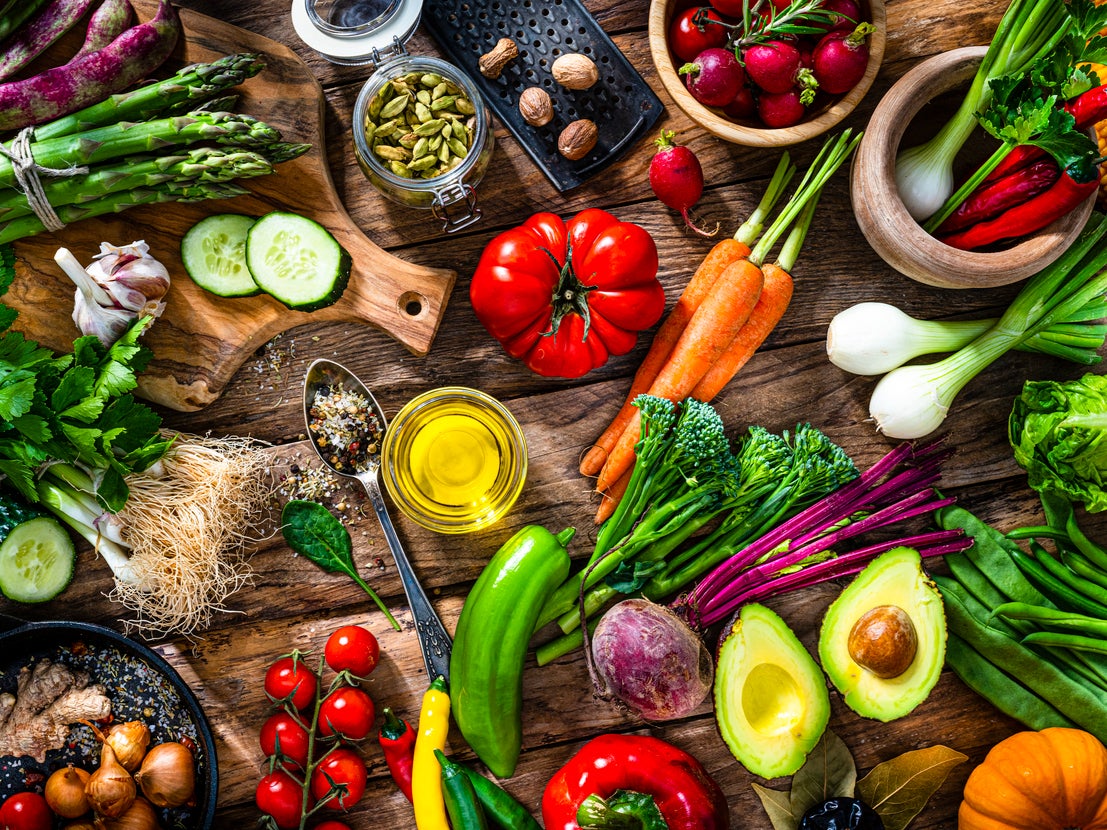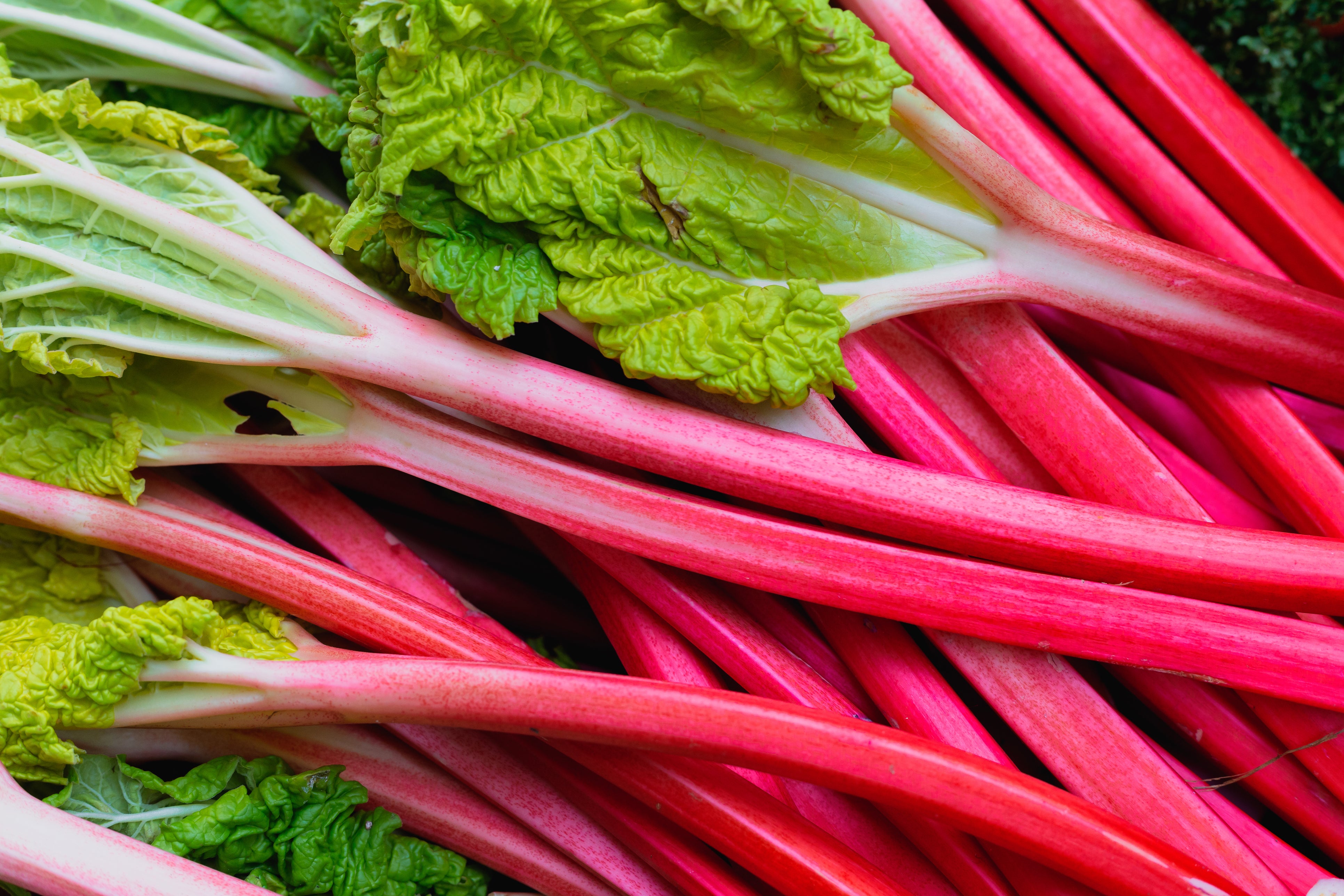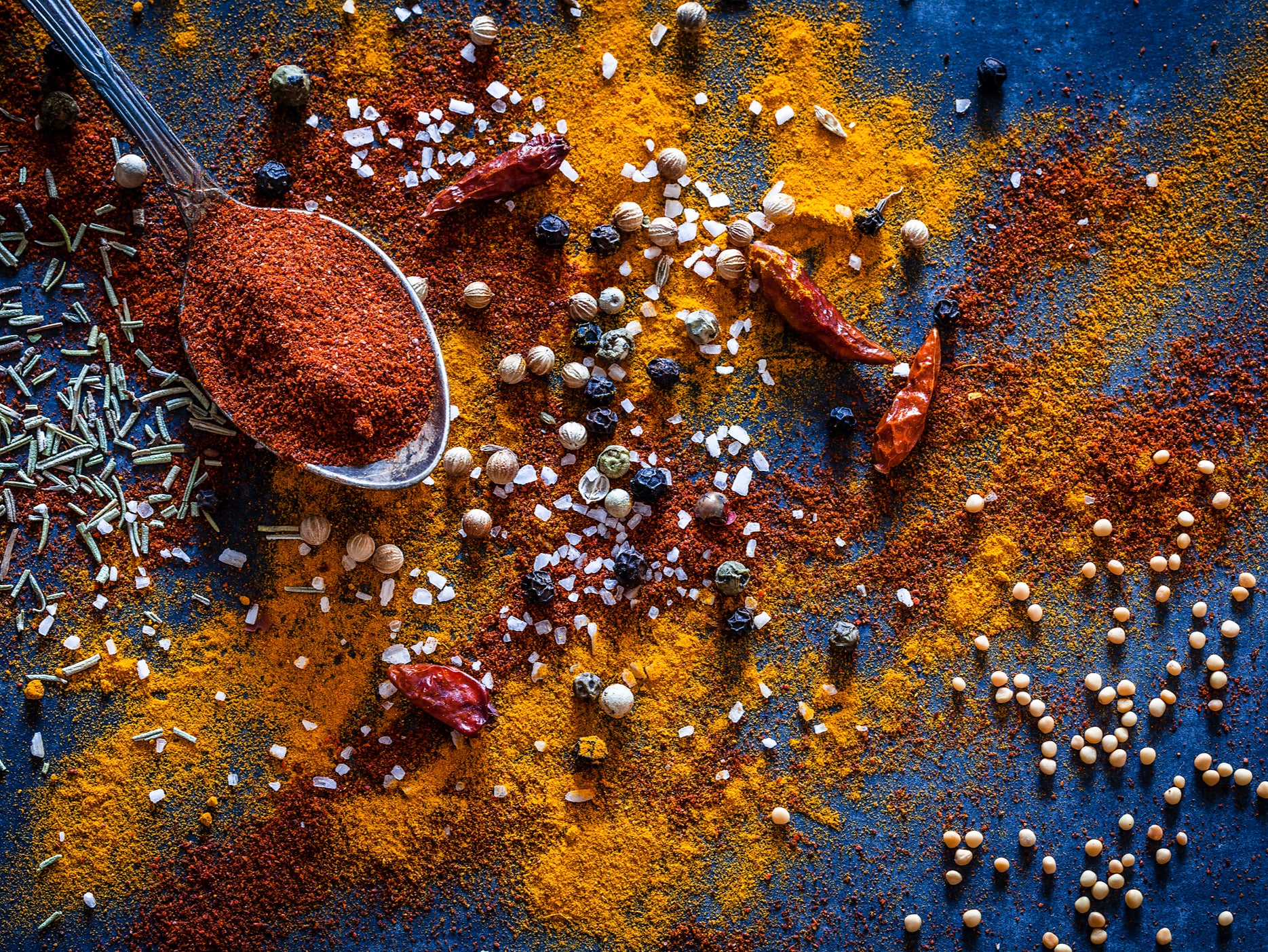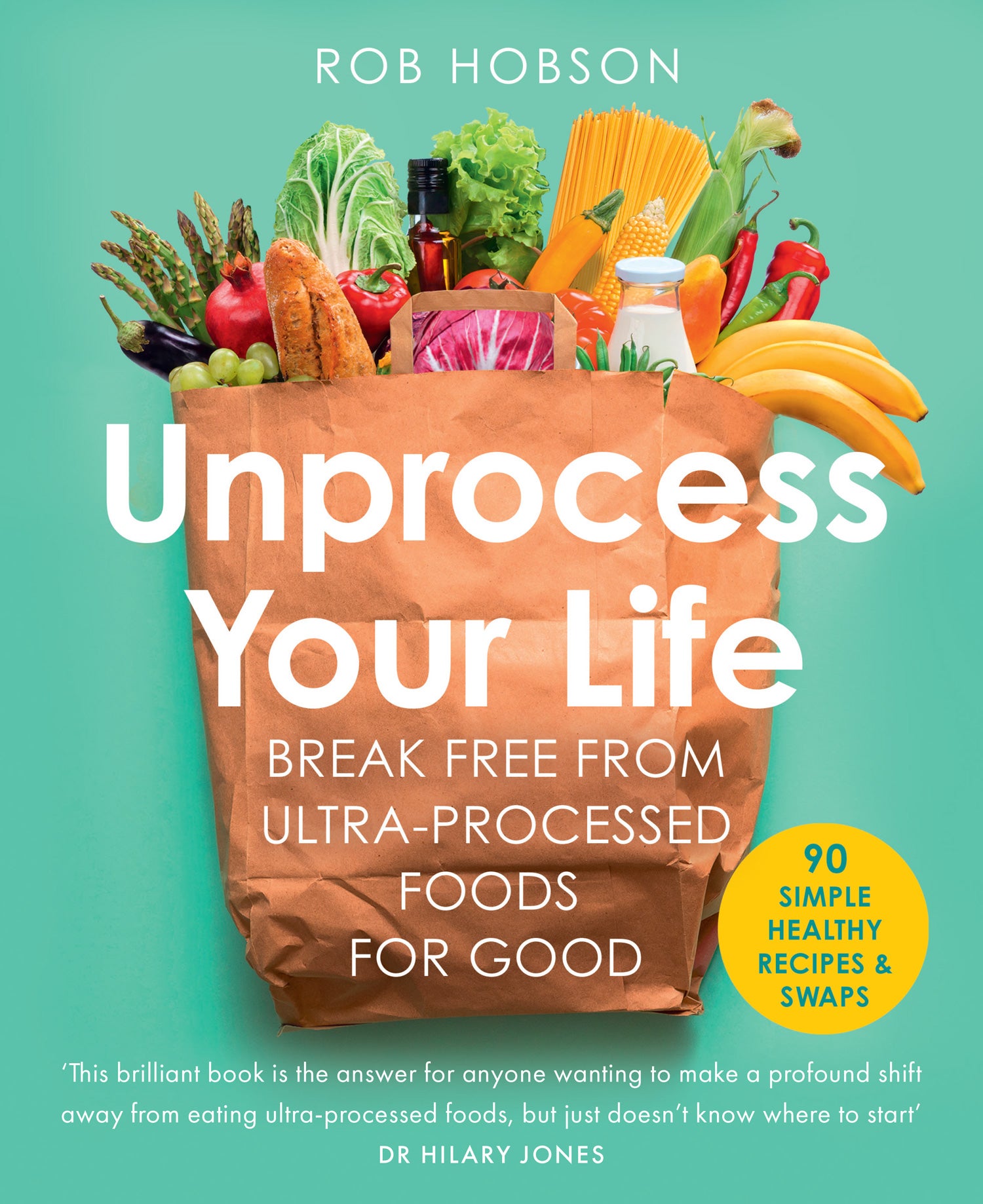How I (just about) manage to eat 30 different plants a week – and why you should too
The message is loud and clear: eat more plants and less ultra-processed foods. But is it really that easy? Maria Lally says yes the 30-a-week goal is totally doable, while food author Rob Hobson explains why it could save your life


Despite being a health editor, shamefully I don’t follow many of the most popular health rules. On a work-heavy day, I rarely take 10,000 steps, I don’t drink enough water and drink a little too much wine in the evenings, and I eat something sweet most nights after dinner.
But one area where I do well is in eating 30 different types of plants per week. Eating as wide a range of plants as possible is said to increase the diversity of the good microbes in your gut, which is the community of bacteria that lives within it.
In a recent study, those who ate 30 different types of plants per week had a reduced risk of obesity, diabetes and depression. Meanwhile, the very latest research from a Harvard University study which tracked 115,000 adults over three decades has found people who eat around seven servings of ultra-processed foods (UPF) per day have an increased risk of early death.
So, how do I eat 30 plants a week? For a start, you need to make a lot of your meals from scratch, which is admittedly easier now I work mostly from home and in light of the Harvard study feels more important than ever.
And secondly, remember that a plant can include fruits and vegetables, but also nuts, seeds, herbs, spices, grains and legumes, such as beans and peas.
Take yesterday for example: for breakfast, I ate porridge topped with blueberries, raspberries and walnuts (three), a satsuma mid-morning (one), a jacket potato with salad including spinach, lettuce, cucumber and yellow pepper for lunch (five), and a slow cooker chicken curry containing garlic, onions, fresh ginger, red pepper, broccoli, and various herbs and spice (eight). That’s 17 different plants in just one day.
The day before I had a sliced banana on my porridge with mixed seeds (five), a homemade tart made with cherry tomatoes and goat cheese with salad (two), and chilli con carne for dinner (which, not counting the garlic and onion, contained tinned tomato, paprika, cumin, fresh and dried chilli, and kidney beans and black-eyed beans). Making it 13 different plants.
There are lots of plants I eat over and over. I have blueberries for breakfast most days, and start most evening meals with garlic and onion. But the rest of the time I try to vary my diet as much as possible, something I probably got from my late mother who used to put lychee and pomegranate seeds in my lunchbox in the 1980s and loved trying new foods.
I use lots of different herbs and spices when cooking, have a cupboard full of all sorts of beans (black-eyed, kidney, chickpeas, lentils) for curries and chilli, and I snack on sugar snap peas and hummus, which both count as a plant. I buy Super Seeds Salad Topper (available at supermarkets, from £2), which contains crunchy roasted seeds and peas, and I sprinkle them liberally on soups, salads, and even yoghurt.
Another way of avoiding a food rut is to avoid the repeat “trolley” order function when you do your online supermarket shop. Rather than buying broccoli each week, I buy red cabbage, cauliflower or bok choy instead, or whatever vegetable is in season (another good way of avoiding a food rut). Sometimes my children complain (although they now love bok choy with their stir fries), but mostly they just tuck in. Oh, and best of all, coffee counts as a plant too.

Why it matters?
Recent findings show that ultra-processed foods have a detrimental effect on almost every part of our bodies. Here, health food author Rob Hobson explains why the link between our diet and gut could explain the latest research, but there are simple things you can do to protect yourself...
Dubbed our second brain, the effects of gut health (and unhealth) are now just being understood. This thriving area of nutrition research is starting to reveal how fundamental our gut is to our wellbeing – concerning mental health, weight maintenance, immunity, hormone regulation, digestion and energy metabolism.
A higher intake of UPF is associated with approximately a 50 per cent increased risk of death related to cardiovascular diseases, a 48 to 58 per cent higher risk of anxiety and common mental disorders, and a 12 per cent increased risk of type 2 diabetes – and I believe this can be tracked back to how well (or badly) our gut is functioning.
The gut obesity connection
Ultra-processed foods are characterised by their extensive industrial processing and often contain artificial colours, emulsifiers, flavours, and other additives. A lot of research into this area has involved obesity as it is a risk factor for nearly all the non-communicable diseases outlined in the new study.
Parallel studies have also shown that the intestinal microbiome is intrinsically linked with obesity risk and that obesity-related metabolic disorders are characterised by specific alterations in the composition and function of the human gut microbiome.
Research shows that the gastrointestinal microbiota can influence both how much energy we get from a diet and how we break down complex carbohydrates and fibres into short-chain fatty acids which are then absorbed to be used as an energy source in the body. The gut microbiome can also influence the regulation of appetite and satiety by producing specific metabolites that act on the brain.
There are several reasons why consuming large quantities of UPFs may impact the health of your gut microbiome. These include the lack of beneficial nutrients in the diet, overconsumption of unhealthy dietary components and excess intake of additives such as emulsifiers and artificial sweeteners. All of these affect our gut, which can in turn affect how effectively we digest and store food.

Swap foods in and out to diversify bacteria in the gut
UPFs (Ultra Processed Foods) are often low in fibre and rich in fats and sugars which negatively affect the diversity of the gut microbiome. To maintain a good diversity of bacteria in the gut, you should increase your fibre intake. Nutrient-dense UPFs may be a way of achieving this, given many people don't eat other fibre-rich foods such as legumes and whole grains.
At the same time, UPFs high in sugar and unhealthy fats – such as ready-made meals, which are often sold as “healthy options” in supermarkets – should be swapped out for naturally sweet whole foods such as fruits, oily fish, nuts and seeds.
The high sugar and fat content in UPFs can also promote the growth of harmful bacteria that thrive on these nutrients. This can lead to an imbalance in the gut microbiota, known as dysbiosis, which can contribute to gut inflammation and increased intestinal barrier permeability, potentially leading to systemic inflammation and increased risk of chronic diseases.
Aside from making dietary changes that improve fibre intake, including probiotics that help feed the good bacteria in your gut, you can also explore foods rich in healthy bacteria, such as plain Greek yoghurt, kefir and fermented vegetables.
Know what makes a good prebiotic diet
Fibre acts as a prebiotic, feeding beneficial gut bacteria that produce short-chain fatty acids (SCFAs) like butyrate, propionate, and acetate. These SCFAs have anti-inflammatory properties, which are essential in maintaining gut barrier integrity and regulating the immune system. The typically low fibre content of UPFs, particularly those that act as prebiotics in the gut, can decrease these beneficial bacteria and their metabolites, potentially compromising gut health and immune function.

You can support your gut bacteria by consuming plenty of prebiotic foods, including garlic, onions, bananas, leeks, asparagus, barley, and oats, as well as cooked then cooled potatoes, rice and pasta that form prebiotic-resistant starches.
Recognise food label ‘red flags’
Some additives commonly found in UPFs, such as emulsifiers, artificial sweeteners, and preservatives, can directly impact the gut microbiota. For example, certain emulsifiers have been shown to alter the composition of the gut microbiota and increase the risk of gut inflammation and metabolic syndrome in animal studies. While these studies do not prove cause and effect in humans, there is a growing body of evidence suggesting that ultra-processed foods negatively affect the microbiome and health.
Research has highlighted significant concerns regarding the impact of emulsifiers found in ultra-processed foods (UPFs) on the gut microbiome, potentially contributing to various gut health issues, including inflammatory bowel disease (IBD), increased intestinal permeability, and inflammation.
Emulsifiers, commonly added to UPFs for texture and stability have been shown in both cell and animal studies to disrupt the mucus architecture of the gut, enhance intestinal permeability, and activate inflammatory pathways. This disruption can promote pro-inflammatory intestinal microbiota which can be a cause of inflammatory bowel disease. However, findings from the new study suggest that evidence to support the link between UPFs and conditions that fall under this term is limited.
Artificial sweeteners may also have an impact and could be one of the factors linking ultra-processed foods to a higher risk of obesity and type 2 diabetes. Sweeteners such as aspartame have been shown to impact insulin resistance, affecting how sugar is absorbed into the bloodstream. Other studies looking into the effects of aspartame and sucralose have shown specific changes in the gut bacteria associated with consuming them. This could lead to alterations in metabolic pathways which have been linked to glucose tolerance and dysbiosis.

The question on everyone's lips regarding UPFs is what additive causes what harm, but the research is not there yet to be conclusive. Studies focusing on emulsifiers and artificial sweeteners are probably the closest link there is so far. This may be a reason to omit these foods from the diet, but any omission of foods should be done sensibly to avoid limiting your intake of other nutrients which could then lead to an unhealthy relationship with food.
Avoid ‘leaky gut’ syndrome
The changes in the gut microbiome associated with UPF consumption, such as increased inflammation and reduced production of SCFAs, can lead to a weakened gut barrier. This matters because an increased permeability can allow bacterial endotoxins to enter the bloodstream which contributes to inflammation and associated health threats that come with that such as an increased risk of inflammatory bowel disease, cardiovascular disease and autoimmune diseases.
The fact that many UPFS have a low nutrient density is a potential driver for poor gut health, but while further research is needed to identify the degree to which additives such as emulsifiers and artificial sweeteners damage the gut microbiota – we do know an increase in high fibre foods such as wholegrains, legumes, fruits and vegetables can help strengthen the gut barrier.
Despite what you choose to believe about the true impact of UPFs on our health and the confusion over the current classification of these foods, it goes without saying that focusing on a diet of mostly whole foods in their most natural state is going to benefit your health.
At the same time, a realistic approach to eating is the likeliest way to achieve long-term consistency and if this means include some UPFs in your diet but balance them out with healthy eating options then so be it. This way people will be able to eat well within the time and budget restraints many have to live with. Knowing there are some easy wins to good gut health is the first step we can all make towards achieving a truly healthy diet.
‘Unprocess Your Life: The new cookbook to help you break free from ultra-processed foods’ by Rob Hobson is out now





Join our commenting forum
Join thought-provoking conversations, follow other Independent readers and see their replies
Comments